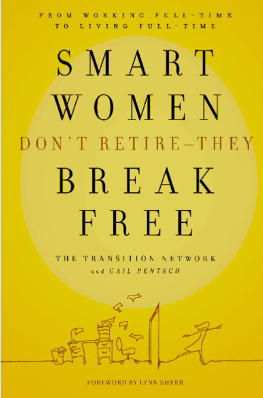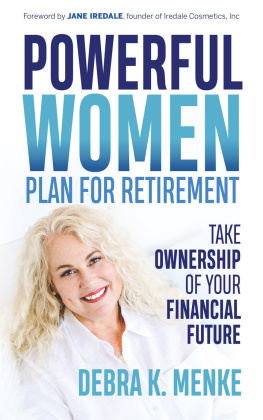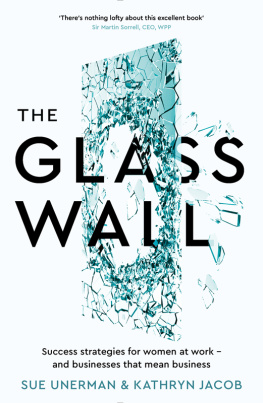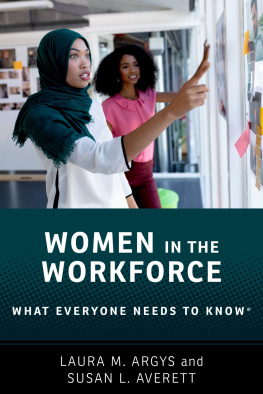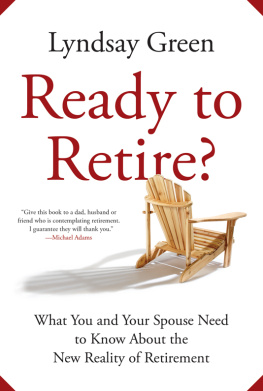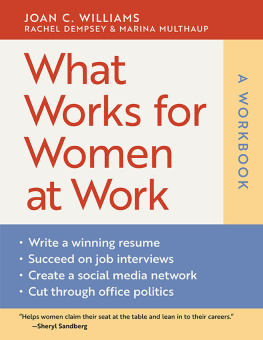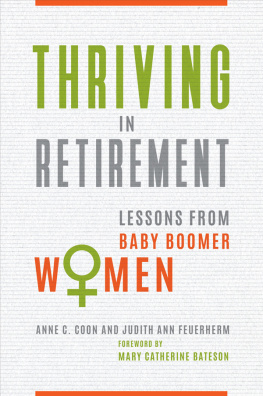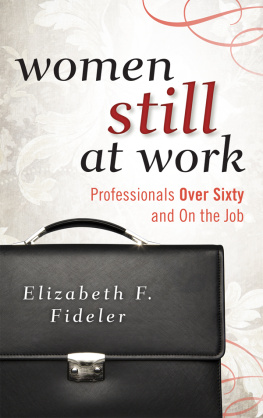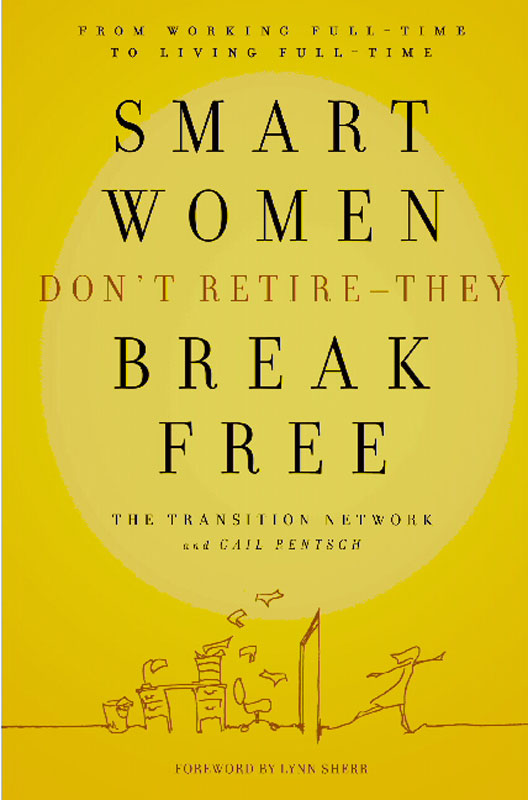Copyright 2008 by The Transition Network, Inc.
Introduction Copyright 2008 by The Transition Network, Inc.
All rights reserved. Except as permitted under the U.S. Copyright Act of 1976, no part of this publication may be reproduced, distributed, or transmitted in any form or by any means, or stored in a database or retrieval system, without the prior written permission of the publisher.
Springboard Press
Hachette Book Group USA
237 Park Avenue, New York, NY 10017
Visit our Web site at www.HachetteBookGroupUSA.com.
First eBook Edition: June 2008
ISBN: 978-0-446-53747-6
Dedicated to
Werner and Denny
and
the fabulous women in The Transition Network
Lynn Sherr
It is the only thing we seem to talk about. We, of course, are the womenwomen who have been there and done itnot all of it, but an awful lot of it, often under the most trying conditions and usually after kicking in a few doors to get there. There, of course, is where we were never meant to benot, at least, according to the rules of society, notably American society, with its back-to-the-kitchen mandate during the maddeningly traditional postwar 1950s. But thanks to many of us, the rules changed, not always peacefully, and new generations of women not only entered the workforce but swam to the top, becoming the voices and the faces and the brains and even the brawn of a newly energized and occasionally confused nation. We challenged the system and cherished the results, setting the pace for our daughters and theirs, all the while transforming jobs into careers and teaching the world that our place, that fabled and long-limited womans place, was indeed everywhere.
So now what?
Now that we, the groundbreakers, are at an age when we considered our mothers old but know that we are not, now that our employers dont necessarily agree, now that we are, or are about to be in transit, some removed from those careers by choice and some by fiat, with adult children long out of the house and spouses either gone from their own lifes work or too early gone from the marriage, what exactly are we supposed to dowith our energy, our connections, our experience, our ideas? What exactly are we supposed to do with ourselves?
It is, as I mentioned, the only thing we seem to talk about.
A friend who was a school psychologist says shes glad she retired because she wanted more timefor herself, her husband, her passions. But it turns out her passion was partly in her school work, and she hasnt been able to replace that. Yet.
A talented film producer is ready to move on after a stellar career, but cant figure out what she wants to do.
A top-notch journalist who wrote and edited her way through much of the breakthrough 1960s is eager to have lunch so we can discuss whats next.
Nowhere in the discussions does anyone mention the possibility of doing nothing.
And its true for everyone, not only those whose pensions or savings accounts arent nearly substantial enough to keep them going without a new source of income.
In fact, part of the lure is the possibility of doing more... for ourselves, for our families, for our community. If that means doing less of what used to seem importantpulling on the pants suit, putting on the faceso be it. Many of us have stared down disease or death too recently to settle for anything short of what simply makes us happy. Many just want some unscheduled afternoons to hang out with grandchildren while we can still beat them to the trampoline. And many crave the opportunity to play out at least one more act, to reach for the stars or burrow down within, whatever makes us feel alive.
But how?
Were scared, were excited, were eager, were reluctant. And most of all, we are bewildered: how to face the reality of no longer having an office to go to, a job that defines you, colleagues to bounce ideas off of, and, oh yeah, a paycheck. You probably know the old joke about retirement: a woman marries a man for better, for worse, but not for lunch. Well, liberation has made retirement a gender-free option, and we are facing not only the notion of fixing lunch every day, but also of eating it alone.
Which is a large part of the problem.
I know now why I went to work in television, a former correspondent confessed to me. I get lonely. I like working with people. She went on: When youre on TV, you never have to work on your social life. Everyone comes to you. The invitations are endless. And now? I have to arrange things, make them happen, if I want to see anyone.
Others say they will miss the power, being at the center of the action, feeling that they matter. It is, and I dont say this unkindly, an addiction. My hero, Susan B. Anthony, who led the campaign for womens rights when much of nineteenth-century America viewed the possibility as a radical threat to the republic, candidly admitted to a newspaper reporter in 1905, Work is my gospel. I am seldom idle. She was eighty-five years old.
Those sentiments are just a few of what Ive collected in the last few years. This book compiles many, many moreconcrete evidence that the angst of friends and colleagues is, in fact, part of a flood of concern across the nation. The good news is, we are not alone. The better news is, there are some answers here, or at least signposts that point the way to new possibilities. By exploring the roots, the issues, the anxiety over retirement, suddenly solutions emerge.
A few of my own friends have gotten there already.
Dont be afraid, counsels a woman with a few years of postcareer experience. Dont think of it as if empty time were the enemy. Let yourself lie fallow for a while. Doors will open that you didnt even know were there.
A close pal, a longtime lawyer, says she has her answer ready for anyone who challenges her decision to drop the casework, give up a schedule, and happily travel with her (also retired) husband, when she is not reading and thinking and otherwise engaging her still very fertile brain. What does she tell people who ask, What do you do? Easy. Im living my life.
Another has put together an exhausting montage of consulting, nonprofit board work, travel, and plenty of time to care for her aging mom and growing grandkids. Its a life, she announces without irony.
Indeed. Living, breathing, thinking, doingwith respect, in control, on our own terms. Im facing it too, asking all the same questions. Smart Women Dont RetireThey Break Free is a great start.
Lynn Sherr is a correspondent with ABCs 20/20 and is the author of the memoir Outside the Box.
Christine Millen and Charlotte Frank, Cofounders of The Transition Network
As we faced the desire to retire from our jobs and leave the prestige and pride in accomplishment that each of us enjoyed from them, we struggled with the question What comes next? We wondered whether our identities were so tied to our work community that making a transition was even possible. After all, it isnt easy to leave a job where you spent much of your adult life, and to do it in our society, which is founded on a strong work ethic, idolizes youth, and equates success with money and job title. The question is even more difficult to answer when so many of these qualities have been central to your own life.
So there we were, confident, successful professionals who felt like teenagers trying to forge an identity. We could not turn to our work friends, since many of them were not yet ready for the discussion. And we saw few examples, guidebooks, or training manuals for a retirement that potentially could last for thirty or forty years. Out of our puzzlement we realized that we needed to do what we always did in the past when we faced similar quandaries. We needed to talk to other women.

